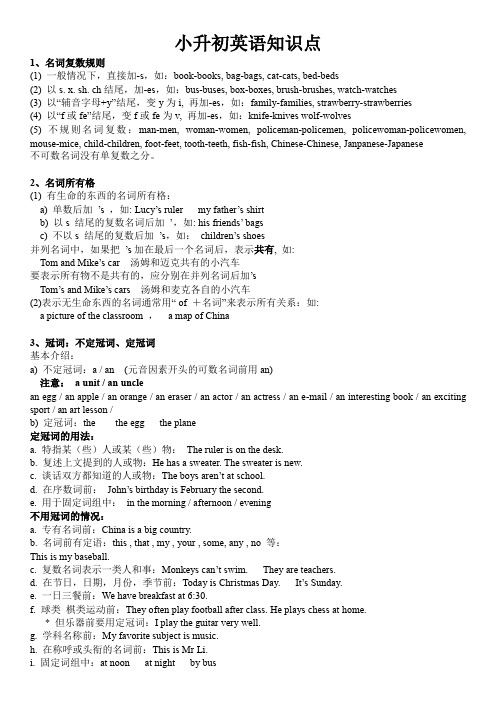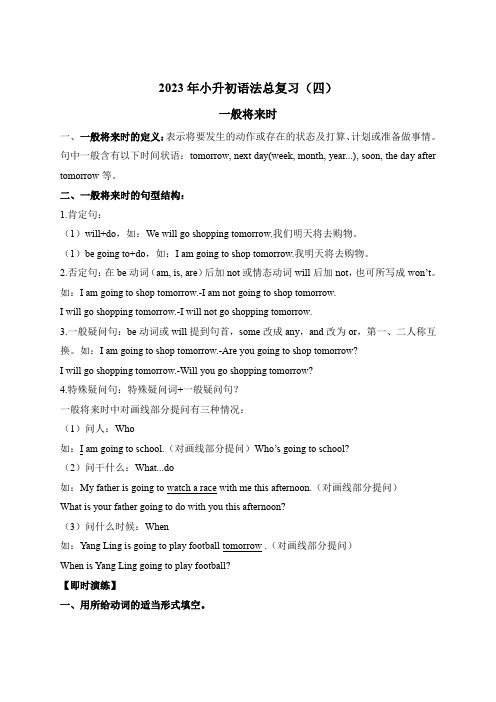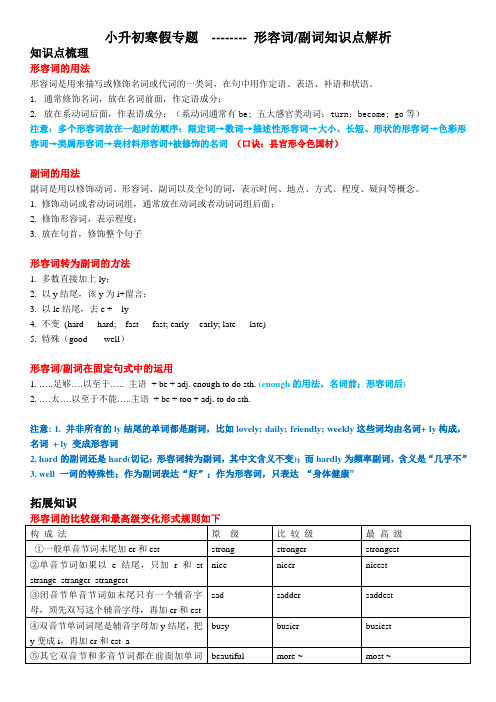(译林版)小升初英语语法整理
译林版小升初英语知识点整理

小升初英语知识点1、名词复数规则(1) 一般情况下,直接加-s,如:book-books, bag-bags, cat-cats, bed-beds(2) 以s. x. sh. ch结尾,加-es,如:bus-buses, box-boxes, brush-brushes, watch-watches(3) 以“辅音字母+y”结尾,变y为i, 再加-es,如:family-families, strawberry-strawberries(4) 以“f或fe”结尾,变f或fe为v, 再加-es,如:knife-knives wolf-wolves(5) 不规则名词复数:man-men, woman-women, policeman-policemen, policewoman-policewomen, mouse-mice, child-children, foot-feet, tooth-teeth, fish-fish, Chinese-Chinese, Janpanese-Japanese不可数名词没有单复数之分。
2、名词所有格(1) 有生命的东西的名词所有格:a) 单数后加’s ,如: Lucy’s ruler my father’s shirtb) 以s 结尾的复数名词后加’,如: his friends’ bagsc) 不以s 结尾的复数后加’s,如:children’s shoes并列名词中,如果把’s加在最后一个名词后,表示共有, 如:Tom and Mike’s car 汤姆和迈克共有的小汽车要表示所有物不是共有的,应分别在并列名词后加’sTom’s and Mike’s cars 汤姆和麦克各自的小汽车(2)表示无生命东西的名词通常用“ of +名词”来表示所有关系:如:a picture of the classroom , a map of China3、冠词:不定冠词、定冠词基本介绍:a) 不定冠词:a / an (元音因素开头的可数名词前用an)注意: a unit / an unclean egg / an apple / an orange / an eraser / an actor / an actress / an e-mail / an interesting book / an exciting sport / an art lesson /b) 定冠词:the the egg the plane定冠词的用法:a. 特指某(些)人或某(些)物:The ruler is on the desk.b. 复述上文提到的人或物:He has a sweater. The sweater is new.c. 谈话双方都知道的人或物:The boys aren’t at school.d. 在序数词前:John’s birthday is February the second.e. 用于固定词组中:in the morning / afternoon / evening不用冠词的情况:a. 专有名词前:China is a big country.b. 名词前有定语:this , that , my , your , some, any , no 等:This is my baseball.c. 复数名词表示一类人和事:Monkeys can’t swim. They are teachers.d. 在节日,日期,月份,季节前:Today is Christmas Day. It’s Sunday.e. 一日三餐前:We have breakfast at 6:30.f. 球类棋类运动前:They often play football after class. He plays chess at home.* 但乐器前要用定冠词:I play the guitar very well.g. 学科名称前:My favorite subject is music.h. 在称呼或头衔的名词前:This is Mr Li.i. 固定词组中:at noon at night by bus4、代词:人称代词、物主代词人称代词物主代词主格宾格第一人称单数I(我)me my(我的)复数we(我们)us our(我们的)第二人称单数you(你)you your(你的)复数you(你们)you your(你们的)第三人称单数he(他)him his(他的)she(她)her her(她的)it(它)it its(它的)复数they(他们/她们/它们)themtheir(他们的/她们的/它们的)5、数词:基数词、序数词基数词(1)1-20one,two,three,four,five,six,seven,eight,nine,ten,eleven,twelve,thirteen,fourteen,fifteen,sixteen,seventeen,eighteen,nineteen,twenty(2)21-99:先说“几十”,再说“几”,中间加连字符。
2023年小学英语六年级小升初语法总复习(四)一般将来时 (译林版含答案)

2023年小升初语法总复习(四)一般将来时一、一般将来时的定义:表示将要发生的动作或存在的状态及打算、计划或准备做事情。
句中一般含有以下时间状语:tomorrow, next day(week, month, year...), soon, the day after tomorrow等。
二、一般将来时的句型结构:1.肯定句:(1)will+do,如:We will go shopping tomorrow.我们明天将去购物。
(1)be going to+do,如:I am going to shop tomorrow.我明天将去购物。
2.否定句:在be动词(am, is, are)后加not或情态动词will后加not,也可所写成won’t。
如:I am going to shop tomorrow.-I am not going to shop tomorrow.I will go shopping tomorrow.-I will not go shopping tomorrow.3.一般疑问句:be动词或will提到句首,some改成any,and改为or,第一、二人称互换。
如:I am going to shop tomorrow.-Are you going to shop tomorrow?I will go shopping tomorrow.-Will you go shopping tomorrow?4.特殊疑问句:特殊疑问词+一般疑问句?一般将来时中对画线部分提问有三种情况:(1)问人:Who如:I am going to school.(对画线部分提问)Who’s going to school?(2)问干什么:What...do如:My father is going to watch a race with me this afternoon.(对画线部分提问)What is your father going to do with you this afternoon?(3)问什么时候:When如:Yang Ling is going to play football tomorrow .(对画线部分提问)When is Yang Ling going to play football?【即时演练】一、用所给动词的适当形式填空。
完整版)译林版小升初英语公式及固定搭配

完整版)译林版小升初英语公式及固定搭配1.加动词原形可以使用can/can’t、will/won’t、shall we、should/shouldn’t、XXX、祈使句、may、help、must/mustn’t和have to加上动词原形。
例如:Can you speak English。
I won’t go to the party。
Shall we play soccer?2.+to+动词原形可以使用want、would you like、it’s time、how、be happy、can’t wait to、need、let、would like和use… to加上动词原形。
例如:I want to eat pizza。
Would you like to come with us。
It’s time to go home.3.+动词ing可以使用be。
no、how about/what about、go、be good at、like、do well in、love、介词+动词ing、start+动词ing和begin+动词ing加上动词ing。
例如:XXX?4.后面跟形容词的动词有be、keep、look、feel、get、stay、e、make、smell、sound和turn。
例如:She looks happy。
He made me angry.5.量词常用的量词有a lot of、some、a few、a little、many、much、too many和too much。
例如:I have a lot of friends。
Can I have some water?6.XXX的用法the常用于特定的事物或人,表示唯一或特定的对象。
例如:The sun is shining。
I saw the movie last night.3.Walk继续走:walk on路过:walk by穿过:XXX4.Up叫醒:wake…up吵醒狮子:wake XXX up捡起:pick …up把它/它们捡起来:pick it/them up爬上:climb up爬上小山:climb up the hill起床:get up5.Away飞走:fly away赶走:XXX走了,离开:go XXX从…搬走:XXX…away from …6.XXX把……倒入:pour…into走进,进入:go into抓紧:hold onto带入……:XXX…into…变成:turn into7.其它词:about。
译林版小升初英语知识点大汇总

译林版小升初英语知识点大汇总(总7页)-本页仅作为预览文档封面,使用时请删除本页-2019小升初英语知识点大汇总小升初英语语法1、名词复数规则、1.一般情况下,直接加-s,如:book-books, bag-bags, cat-cats, bed-beds2.以s. x. sh. ch结尾,加-es,如:bus-buses, box-boxes, brush-brushes, watch-watches3.以“辅音字母+y”结尾,变y为i, 再加-es,如:family-families, strawberry-strawberries4.以“f或fe”结尾,变f或fe为v, 再加-es,如:knife-knives5.不规则名词复数: man-men, woman-women, policeman-policemen, policewoman-policewomen, mouse-mice child-children foot-feet,.tooth-teeth fish-fish, people-people, Chinese-Chinese, Japanese-Japanese5.2、一般现在时1.一般现在时表示经常或习惯性的动作,也可表示现在的状态或主语具备的性格和能力。
2.一般现在时中,没有be动词和情态动词,主语为第三人称单数的肯定句,动词要按规则加上s,主语是非第三人称单数的肯定句,动词用原形。
3.在一般现在时中,句中有be动词或情态动词时,否定句在be动词和情态动词后加not,一般疑问句将be动词或情态动词放在句首。
4.在一般现在时中,句中没有be动词或情态动词时,主语为第三人称单数的否定句在动词前加does+not (doesn’t),一般疑问句在句首加does,句子中原有动词用原形;主语为非第三人称单数,否定句用do+not (don’t),一般疑问句在句首加do,句子中动词用原形。
译林小升初英语语法提升--必背速记口诀

译林小升初英语语法提升必背速记口诀班级__________ 姓名 ___________ 学号___________句型转换口诀一般疑问句和否定句变化口诀:一般问句并不难,谓语调到主语前。
大写小写有变化,句末要把问号加。
第一人称常变二。
否定句就更简单,中间加上一not,谓语动词提到前。
特殊疑问句速记:特殊疑问句,变起来有程序,第一,确定疑问词,第二,代替划线语,第三,将疑问词放句首,疑问词后加一般疑问句,语序倒置要牢记。
时态口诀一般现在时口诀一般现在时,表示常常做的事,非单三人称作主语,动词原形就可以,疑问否定也不难,do和don't来成全,单三人称作主语,动后加属规律,结尾若是sh,ch,s,和x,后加es别忘记,疑问否定用does和doesn't,句中动词现原形,时间状语用often,sometimes也可以。
现在进行时口诀说的是目前正做的事,Be+动词ing,变疑问Be提前,变否定也容易,Be后not加上去,时间状语用nowLook, listen是语境。
一般将来时口诀一般将来时,是说将要发生的事,Will后加原形动词,一人称可用shall替,否定疑问很容易,只用will,shall就可以,next, later, tomorrow时间状语要牢记时间名词前所用介词年月周前要用in 日子前面却不行遇到几号要用on,上午下午又是in要说某日上下午,用on换in才能行午夜黄昏须用at,黎明用它也不错at也用在明分前,说差可要用上to多说多练牢牢记,莫让岁月空蹉跎。
一般过去时口诀:规则动词加ed,不规则的必须记否定形式疑问句,没有be就加did如把did加在前,动词也要还原形动词口诀be动词速记:be动词有三个am, is还有areI跟am, you跟areis连着他,她,它,单数后面跟is,复数后面都跟are.have/has速记:have/has表拥有,你有我有大家有;两种形式有不同,男他女她动物它,张三李四单个他,has与之紧相伴;其他形式都跟have。
2023年小学英语六年级小升初语法总复习(二)现在进行时 (译林版含答案)

2023年小升初语法总复习(二)现在进行时1.现在进行时的定义:表示现在正在进行或发生的动作,也可表示当前一段时间内的活动或现阶段正在进行的动作。
句中一般含有now, look, listen等词。
2.现在进行时的句型结构:(1)肯定句:主语+be动词+现在分词+其他.如:Tom is reading newspapers in the living room.汤姆正在客厅里看报纸。
(2)否定句:主语+be动词+not+现在分词+其他.如:Tom is not reading newspapers in the living room.汤姆没有在客厅里看报纸。
(3)一般疑问句:Be动词+主语+其他?(be动词提到句首)如:Is Tom reading newspapers in the living room?汤姆正在客厅里看报纸吗?(4)特殊疑问句:特殊疑问词+一般疑问句?【注意】当画线部分包含谓语动词时,用特殊疑问词代替画线部分放到句首,原画线处应加上doing。
如:Tom is reading newspapers in the living room.(对画线部分提问)What is Tom doing in the living room?3.动词现在分词的变化规则:(1)一般情况下,在词尾直接加-ing。
如:cook-cooking, look-looking, listen-listening。
(2)以不发音的e结尾的单词,去e加-ing。
如:make-making, taste-tasting。
(3)以重读闭音节结尾,且词尾只有一个辅音字母,则双写这个辅音字母,再加-ing。
如:run-running, stop-stopping, put-putting。
【即时演练】一、单项选择。
( )1.My brother his car in the garden now.A.washesB.is washingC.washed( )2.—Can Peter play games with us, Mrs Frank?—No. He a shower at this moment.A.is takingB.takesC.took( )3.Tom often swimming. But now he football.A.go; is playingB.goes; playsC.goes; is playing ( )4.—Alice, don’t play the guitar! I on the phone.—Oh, sorry, Mum.A.talkingB.talkC.am taking ( )5.Shh! My sister now.A.sleepsB.is sleepingC.sleep( )6.Listen! Mary an English song in the classroom.A.is singingB.singC.sings二、用所给单词的适当形式填空。
译林版小升初英语公式及固定搭配

译林版小升初英语公式及固定搭配小升初英语公式及固定搭配(译林版)一、公式类:1.动词+名词(动名词)例句:She enjoys swimming in the pool.(她喜欢在游泳池里游泳。
)2. 动词+ to do (不定式)例句:I want to go shopping.(我想去购物。
)3. 主语+ be+ 形容词例句:The book is interesting.(这本书很有趣。
)4. 主语+ be + 名词例句:He is a teacher.(他是一名教师。
)5. 主语+ be+ from+ 地点例句:My friend is from China.(我的朋友来自中国。
)6. be+ 感觉动词例句:I am hungry.(我饿了。
)7. be+ 形容词+ 名词例句:She is a beautiful girl.(她是一个漂亮的女孩。
)8. be+ 动词+ 名词例句:This is a place to play.(这是一个玩耍的地方。
)9. 主语+ have+ 名词例句:They have a pet dog.(他们养了一只宠物狗。
)10. 主语+ can/ can’t+ 动词原形例句:I can swim.(我会游泳。
)/ I can’t swim.(我不会游泳。
)二、固定搭配类:1. be good at(擅长)例句:She is good at playing the piano.(她擅长弹钢琴。
)2. be interested in(对…感兴趣)例句:He is interested in playing basketball.(他对打篮球感兴趣。
)3. be famous for(以…闻名)例句:China is famous for the Great Wall.(中国以长城闻名。
)4. be different from(与…不同)例句:My hobby is different from yours.(我的爱好与你的不同。
【译林版专用】小升初英语语法复习讲义——形容词、副词(含答案)

小升初寒假专题-------- 形容词/副词知识点解析知识点梳理形容词的用法形容词是用来描写或修饰名词或代词的一类词,在句中用作定语、表语、补语和状语。
1. 通常修饰名词,放在名词前面,作定语成分;2. 放在系动词后面,作表语成分;(系动词通常有be; 五大感官类动词;turn;become; go等)注意:多个形容词放在一起时的顺序:限定词→数词→描述性形容词→大小、长短、形状的形容词→色彩形容词→类属形容词→表材料形容词+被修饰的名词(口诀:县官形令色国材)副词的用法副词是用以修饰动词、形容词、副词以及全句的词,表示时间、地点、方式、程度、疑问等概念。
1. 修饰动词或者动词词组,通常放在动词或者动词词组后面;2. 修饰形容词,表示程度;3. 放在句首,修饰整个句子形容词转为副词的方法1. 多数直接加上ly;2. 以y结尾,该y为i+留言;3. 以le结尾,去e + ly4. 不变(hard --- hard; fast --- fast; early -- early; late --- late)5. 特殊(good ---- well)形容词/副词在固定句式中的运用1. …..足够….以至于….. 主语+ be + adj. enough to do sth. (enough的用法,名词前;形容词后)2. ….太….以至于不能…..主语+ be + too + adj. to do sth.注意: 1. 并非所有的ly结尾的单词都是副词,比如lovely; daily; friendly; weekly这些词均由名词+ ly构成,名词+ ly 变成形容词2. hard的副词还是hard(切记:形容词转为副词,其中文含义不变);而hardly为频率副词,含义是“几乎不”3. well 一词的特殊性;作为副词表达“好”;作为形容词,只表达“身体健康”拓展知识比较级用法(两者之间)1. 句子中有than(比)2. A or B, which is 比较级3. 有much; far; even修饰最高级用法(三者之间或三者以上)1. 句中有one of2. A, B, or C基础题练习一、写出系动词(至少6个)________________________ ________________________ ________________________ ________________________ ________________________ ________________________二、将下列形容词变为副词1. happy ________________________2. slow______________________3. careful________________________4. quick____________________5. comfortable____________________6. angry___________________7. real ________________________ 8. terrible ________________________ 9. late ________________________ 10. early ________________________ 11. good ________________________ 12. hard_________________三、选择题( )1. He looks .A. happyB. happilyC. sadly( )2. Do you feel now ? Thanks , I’m Ok.A. goodB. wellC. badly( )3. My sister is to look after herself.A. old enoughB. enough oldC. older enough( )4. There isn’t to every student.A. book enoughB. books enoughC. enough books( )5. He is ill today. So he looks .A. tiredB. happilyC. sadly( )6. My brother doesn’t feel today.A. goodB. wellC. happily( )7. The food smells . I don’t like itA. goodB. badlyC. bad( )8. He writes very .A. carefulB. carefullyC. bad( )9. I study very .A. hardB. hardlyC. careful( )10. Our country is becoming _______.A. strongB. stronglyC. richly( )11. Is there in the newspaper?A. something newB. new anythingC. anything new( )12. There is with my bike. It works well.A. nothing wrongB. wrong somethingC. something wrong( )13. He speaks for me to understand.A. too slowlyB. slowly enoughC. enough slowly( )14. He runs to catch up with me .A. too fastB. quick enoughC. quickly enough四、用恰当的词填空1. My father feels ___________ (good) today.2. _________(happy), I passed the exam.3. My father looks ____________(angry).4. My father looks ______________(angry) at me.5. She did her homework very ______________(careful).6. Lily is ____________(care). And she does everything ______________(careful).7. Don’t drive _____________(quick) on rainy days.8. They gave us a _______________(warm) welcome.9. They welcome us _____________(warm).10. The fish taste very ____________(bad).11. The flowers smell _______________(sweet).12. Your ideas sound ________________(great).13. ___________(lucky), he wasn’t badly hurt in the car crash.14. He is _____________(bad) ill.15. There are many _______________(beautiful) flowers.提高题练习一、写出以下各形容词的比较级和最高级1. nice _________ _________2. fat _____ ________3. slow _______ ___________4. dry __________ _________5. happy ________ _________6. wet ________ ____________7. much _______ _________8. ill ________ _________9. little ________ __________ 10. bad _________ _________ 11. thin __________ _________ 12. far _________ ___________ 13. early _______ _________ 14. careful_________ _________ 15. exciting _____ ___________16. busy __________ ________二、根据单词的合适形式填空1. Fred is the _________________ (short ) in his class .2. My book is ____________ ( new ) than my sister’s .3. That piece of chicken is the _________________ ( heavy )in the fridge .4. Her rule is _________________(long), and it’s the __________________(long)of ours all .5. Is a fish ____________________(thin) than a bird ?6. A rose tree isn’t __________________( short ) than a pear tree .7. The leopard can run __________________( fast), but the cheetah can run ________________( fast) than it . It can run ___________________( fast ) in the world .8. Is she the ___________________(old ) woman in the world ?9. Which is __________________( big ), a dinosaur or a blue whale ?The blue whale is ____________________( big ) than a dinosaur , it is the __________________(big) animal in the world . And elephant is the ___________________(big) animal on land .10. My father leaves home __________________(early ) than me .11. This zoo is much __________________(good ) than the old one .12. My brother is much __________________(tall ) than my cousin .13. The shoe shop is ____________________(near) the park .14. This bag is very ___________________( heavy), but that one is __________________(heavy) than this one . It’s the ___________________( heavy) of all .15. Jiamin is __________________( tall ). But Yongxian is __________________( tall ) than him .三、单选题1. Lucy is very short, but she is __________ than her sister.A. shorterB. longerC. tallerD. older2. Sam is __________ at Chinese than Jim.A. goodB. wellC. betterD. gooder3. This one is too large. Can you show me a __________one?A. largerB. largeC. smallD. smaller4. —Do you think March is __________ than January?—Yes, it’s __________ warmer.A. better, a littleB. well, muchC. worse, veryD. nicer, quite5. His Frenc h isn’t so good as __________.A. herB. sheC. hisD. hers6. Her bag is newer than __________.A. mineB. myC. meD. I7. Lin Tao is younger than __________ boy in his class.A. any othersB. any otherC. the otherD. the others8. Which one is __________, this one or that one?A. goodB. badC. bestD. worse9. The weather in North China is colder than __________ in South China.A. \B. thisC. the oneD. that10. I think your room is __________ bigger.A. a lotB. a lot ofC. lots ofD. more11. She is only 2 years old. She is ________go to school.A. too young toB. young enough toC. enough young toD. too young not to12. The room is _____ to put down these things.A. large enoughB. enough largeC. enough bigD. too large13. Do you have ______ to buy the books? --- Yes. But I am too little _____ carry them.A. enough money; toB. money enough; not toC. enough money; / D/ money enough; to14. The room is big enough ____ me to live ____.A. for; inB. to; /C. for; /D. for; on15. She is one of ____________ in our class.A. the tallest studentB. tallest studentsC. the tallest studentsD. tall students基础题练习一、写出系动词(至少6个)feel; look; taste; smell; sound; be; seem二、将下列形容词变为副词略三、选择题ABACA BCBAA CABA四、用恰当的词填空1. well2. Happily3. angry4. angrily5.carefully6. careful; carefully7. quickly8. warm9. warmly 10. bad11. sweet 12. great 13. Luckily 14. badly 15. beautiful提高题练习一、写出以下各形容词的比较级和最高级1. nicer nicest2. fatter fattest3. slower slowest4. drier driest5. happier happiest6. wetter wettest7. more most 8. worse worst 9. little less least10. worse worst 11. Thinner thinnest 12. farther farthest13. earlier earliest 14. More careful most careful15. more exciting most exciting 16. busier busiest二、根据单词的合适形式填空1. shortest2. newer3. heaviest4. longer longest5. thinner6. shorter7. fast faster fastest8. oldest9. bigger; bigger; biggest; biggest 10. earlier 11. better 12. taller 13. nearer 14. heavy; heavier; heaviest 15. tall taller三、单选题CCDAD ABBDA AAAAC。
- 1、下载文档前请自行甄别文档内容的完整性,平台不提供额外的编辑、内容补充、找答案等附加服务。
- 2、"仅部分预览"的文档,不可在线预览部分如存在完整性等问题,可反馈申请退款(可完整预览的文档不适用该条件!)。
- 3、如文档侵犯您的权益,请联系客服反馈,我们会尽快为您处理(人工客服工作时间:9:00-18:30)。
(译林版)小升初英语语法整理一、时态1.一般现在时(1)表示经常发生的动作或事情,通常用“usually通常, often常常, every…每…, sometimes有时,always总是,”等词。
(2)基本结构:I / You / We / They He / She / It肯定句动词原形动词第三人称单数形式否定句don’t + 动原doesn’t + 动原一般疑问句(Yes/No) Do… ? Yes, I do.Does…(动词原形)…?No,she doesn’t.特殊疑问句What do …?How does she…(动词原形)…?(3) 动词第三人称单数形式(同名词单数变成复数方法相同)1 一般情况 +s 如:walk-walks2. 辅音字母+y结尾去y +ies fly-flies3. 结尾是 s, x, sh, ch +es watch-watches4. 特殊的 do-does ,have-has, go-goes2.现在进行时,(1)表示正在发生的动作,通常用“now现在, look看,linsen听”.(2)基本形式: be + 动词ingeg: I am(not) doing my homework.You/We/They are(not) reading.He/She/It is(not) eating.What are you doing?Is he reading?(3)动词的现在分词形式(动词+ing)一般情况 +ing walk—walking结尾是不发音的 e -e + ing come—coming重读闭音节双写最后一个字母+ing run-runningswim-swimming3. 一般过去时(1)表示过去已经发生的事情,通常用“last …上一个…, just now刚才, a moment ago刚才, yesterday昨天”等词。
(2) be 动词的过去式: am/is—was are—were(3)过去式基本结构肯定句(Positive)动词过去式 I went shopping last night.否定句(Negative) Didn’t + 动词原形I didn’t go shopping last night.一般疑问句(Yes/No) Did …+ 动词原形…? Did you go shopping last night?特殊疑问句(wh-) What did…+ 动词原形…? What did you do last night?(4)词过去式的变化:规则动词的变化:一般动词 +ed planted,watered,climbed以不发音的e结尾 +d liked辅音字母加y结尾 -y+ ied study—studied, cry- cried重读闭音节单词,末尾只有一个辅音字母双写最后一个字母+ed stop –stoppedplan - planned不规则动词的变化:原形过去式原形过去式原形过去式原形过去式sweep swept teach taught have had go wentkeep kept think thought do did find foundsleep slept buy bought eat ate say saidfeel felt drink drank is/am was take tookread read give gave are were mean meantput put sing sang drive drove meet metcut cut begin began speak spoke make madelet let ring rang write wrote see sawfly flew run ran ride rode come camedraw drew sit sat hear heard tell toldgrow grew learn learned/ learnt get got know knew4.一般将来时一般将来时表示将来打算做的事或将要发生的事情。
常常与tomorrow, next Sunday等时间状语连用。
结构:be going to +动词原形或will +动词原形例如:I’m going to visit my grandpa next week.二、人称代词主格 I we you he she it they宾格 me us you him her it them形容词性物主代词 my our your his her its their名词性物主代词 mine ours yours his hers its theris(注:介词,动词后面跟宾格。
后面没有名词时用名词性物主代词。
)三、可数名词的复数形式1.一般名词: + s a book –books2.辅音字母加y结尾: - y+ ies a story—stories3.以s, x,sh, ch ,结尾: + es a glass—glasses;a watch-watches4.以f或fe结尾: - f 或fe 变为 ves a knife –knives a shelf-shelves5.特殊的名词复数man-men, woman-women, policeman-policemen, policewoman-policewomen, mouse-micechild-childrenfoot-feet,.tooth-teethfish-fish, people-people, Chinese-Chinese, Japanese-Japanese四、不可数名词(没有复数形式)bread, rice, water, juice,milk,tea,coffee五、缩略形式I’m = I am you’re = you are she’s = she is he’s = he is /he has(got)it’s = it is who’s =who is can’t =can not isn’t=is not didn’t=did not weren’t=were not wasn’t=was not let’s=let us I’ll=I will六、a. an .the的用法1.单词的第一读音是辅音读音:a book, a peach,a “U”单词的第一个读音是元音读音:an egg, an hour,an “F”2.the要注意的:球类前面不加the,乐器前面要加the,序数词前面要加the。
七、介词1.表示方位:on, in ,in front of, between, next to, near, beside, at, behind.,under2.表示时间:(1)at : 几点前面用at如:at six o’clock, 没有day的节日前用at如:at Christmas, 固定词组 at the weekends ,at night(2)on: 星期前用on 如:on Monday ,日期前用on 如:on the 15th of July 带有Day的节日前用on 如: on National Day(3)in: 早晨,中午,晚上前用in:in the morning ,in the afternoon ,in the evening ,月份前用in ,如in December ,季节前用in ,如 winter八、基数词变成序数词的方法1. 直接在基数词词尾加上th。
如:seventh第七,tenth 第十,thirteenth 第十三,2.以y结尾的基数词,变y为i,再加上eth。
如:twentieth 第二十。
3.不规则的。
如:first 第一, second 第二, third 第三,fifth 第五, eighth 第八,ninth 第九,twelfth 第十二。
4.有两个或以上单词组成的基数词只改最后一个单词如twenty-first 第二十一。
九、some /any的用法1.肯定句中用some:I have some toys in my bedroom.2.问句和否定句中用ang:Do you have any brothers or sisters?He hasn’t got any pencils in his pencil-case.3.询问想要什么时用some:Would you like some juice?Can I have some stamps?十、 there be结构1.肯定句(有…): There is +单数或不可数名词There are +复数注:遵循就近原则,看靠there be最近的2.一般疑问句(有…吗?):Is there …? Yes, there is./ No, there isn’t.Are there…? Yes, there are. /No, there aren’t.3.否定句(没有):There isn’t …. There aren’t….4.there be句型与have(has) 的区别:there be 表示在某地有某物(或人);have(has) 表示某人拥有某物。
十一、祈使句Sit down pleaseDon’t sit down, please.Let’s go to the park.(注:祈使句中动词用原形)十二、(情态)动词can, may, must, should, will 后面直接用动词原形。
1. I / He / She / They can sing. May I come in? I must go now.2. You should be quiet in the library.3. You’ll be good friends.十三、形容词和副词的比较级一、形容词的比较级1、两个事物或人的比较用比较级,比较级后面一般带有单词than。
比较级前面可以用more, a little 来修饰表示程度。
2.形容词加er的规则:⑴一般在词尾加er ;⑵以字母e 结尾,加r ;⑶以一个元音字母和一个辅音字母结尾,应双写末尾的辅音字母,再加er ;⑷以“辅音字母+y”结尾,先把y变i,再加er 。
3.不规则形容词比较级:good-better, beautiful-more beautiful二、副词的比较级1.形容词与副词的区别 (有be用形,有形用be;有动用副,有副用动)⑴在句子中形容词一般处于名词之前或be动词之后⑵副词在句子中最常见的是处于实义动词之后2.副词比较级的变化规则基本与形容词比较级相同 (不规则变化:well-better, far-farther)十四、特殊疑问句What(问什么事,什么物或什么工作) What are you doing?I’m reading.What is that? It’s a book.What is she?(What’s her job?)She’s a nurse.What colour(问颜色) What colour is your coat?It’s red.What time(时间) What time is it?What’s the time?It’s seven.when(什么时候) When do you get up? I get up at six thirty.When is your birthday? It’s on the 21st of December.Which(哪一个) Which is your watch, the yellow one or the white one? The yellow is mine.Who(谁) Who is the man with a big nose? He’s my uncle.Whose(谁的) Whose bag is it?Whose is this bag? It’s his bag.Where(哪里) Where is my ball pen? It’s under the book.Why(为什么) Why do you like summer? I like summer because…How many (多少) How many books are there in the school bag? There are four books in the school bag. How old (几岁) How old is the young man? He’s nineteen.How much(多少钱) How much is the toy bear? It’s eleven yuan.How (怎么样) How do you go to school everyday? I go to school by car.。
